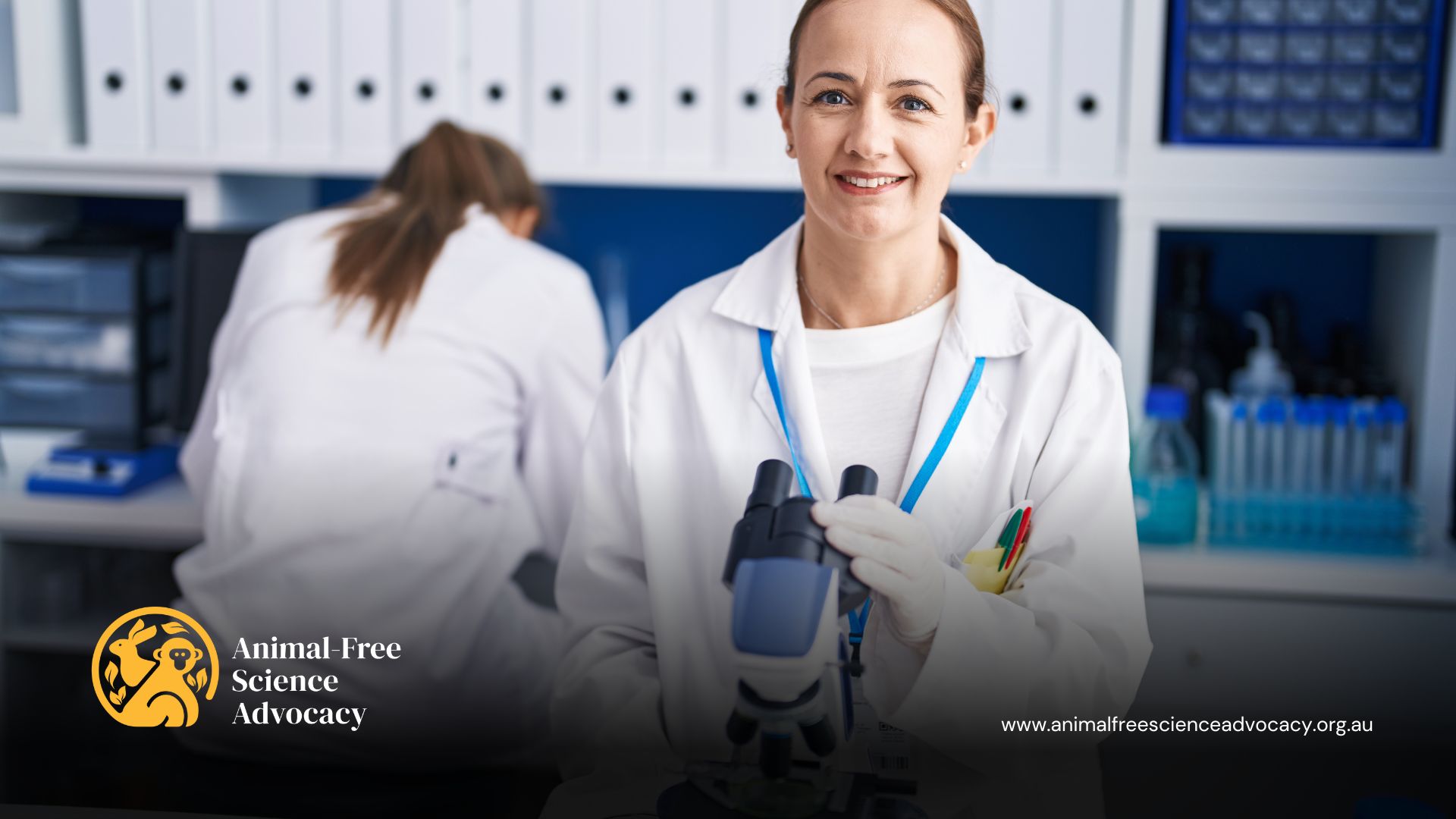
For Researchers
Researchers can drive a paradigm change towards non-animal research methods.
This page highlights the advantages of using alternative research methods. Researchers are invited to engage with AFSA to feature their research and join networks that supports non-animal research innovations. The page also lists various resources and training opportunities for those interested in making a transition to animal-free research methods.
On This Page:
An estimated 10.7 million animals are used in research in Australia every year [International comparison], however, according to the Code, animals should be used only where there is no valid replacement. Additionally, veterinarians are required in the Vet Code to use best practice at all times, which requires first using replacement.
In 2023 CSIRO Futures acknowledged the economic case/benefits in support of transitioning to non-animal models in Australia.
Review the regulations pertaining to animal research and review a summary of recent publications involving animals.
See historical statistics of animal use in research and education.
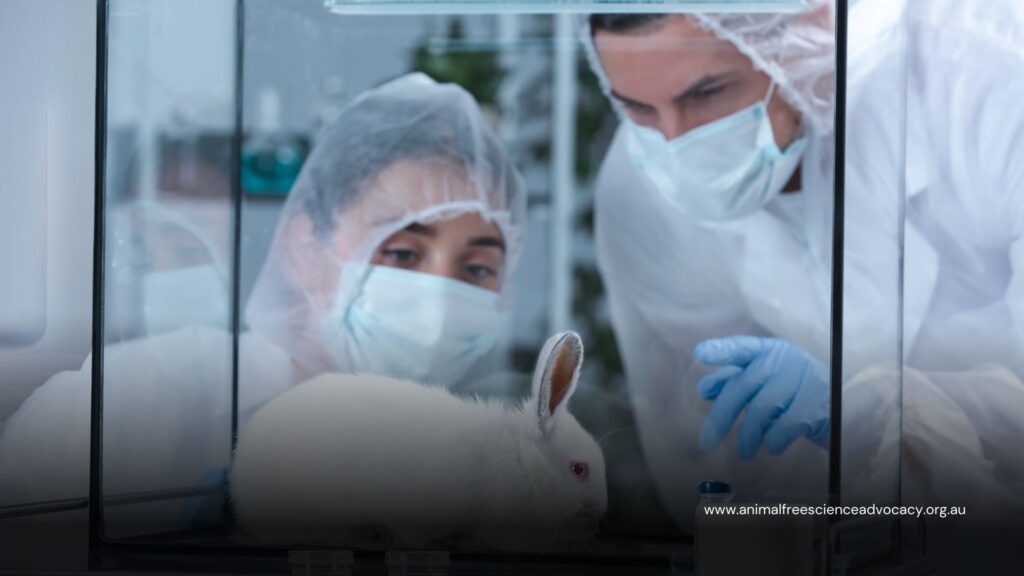
Support to the research community
Whilst we do not operate any grant funding programs, Animal-Free Science Advocacy endeavours to support researchers via our resources, alternatives search assistance, supportive statements for funding applications, and by advocacy efforts to reduce barriers to adopting non-animal methods.
Statement of Support for Non-Animal Research Models
Australian research institutions, medical companies, and industry associations are urging the government to implement a strategy promoting non-animal research models. With the global market expected to grow, Australia’s lack of coordinated effort hinders its potential in this field. Despite strengths in certain areas, such as organoid research, leveraging these advantages requires increased investment and strategic alignment.
Organisations are encouraged to sign a statement of support, advocating for a national focus on non-animal models to seize future opportunities in biomedical research.
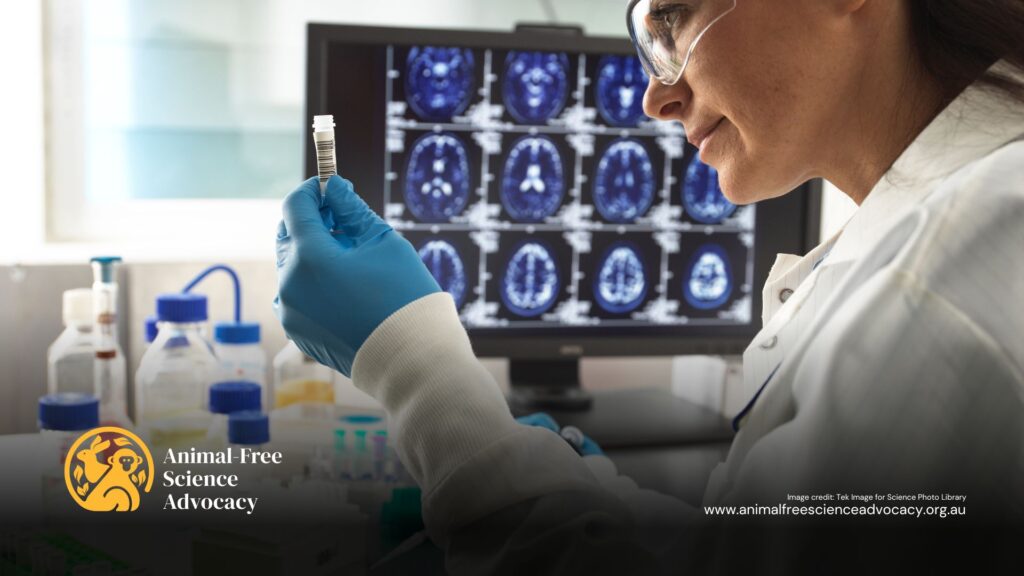
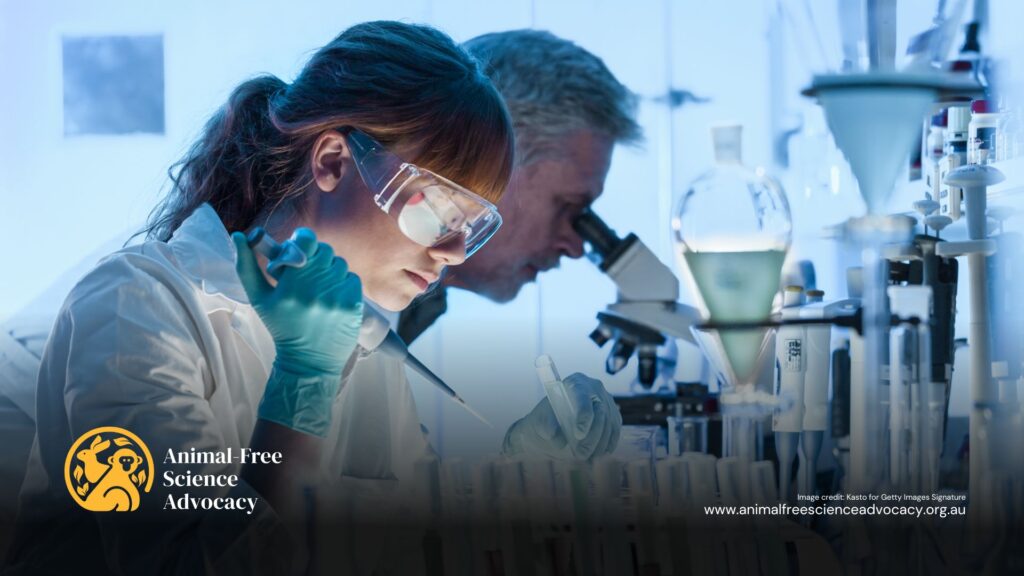
Why look for animal-free methods?
There are increasing scientific and ethical concerns with animal research in recognition of the limitations of animal models to replicate human-biology. You can view recent papers discussing these limitations here. Publications co-authored by the United States Food and Drug Administration (FDA) on the progress already being made in alternatives in regulatory science can be viewed here.
Business Case for Alternatives
Animal-Free Science Advocacy’s Business Case for Alternatives outlines the economic advantages of a transition to non-animal research methods.
CSIRO Non-Animal Model Report
CSIRO’s 2023 report ‘Non-animal models: A strategy for maturing Australia’s medical product development capabilities’ details the opportunities for Australian research.
Reports on Alternative Scientific Methods to Animal Testing
Recommended Journals
Better Ways to Do Research: An overview of methods and technologies that can replace animals in biomedical research and testing.
Optimising Inhalation Research: Transitioning to human-relevant research
Alternatives to Animal Models: Searching for Alternatives
Please see the below list of Alternatives Validation Centres associated with universities or scientific institutes:
• ECVAM – The European Centre for the Validation of Alternative Methods.
• ICVAAM (USA) – Interagency Coordinating Committee on the Validation of Alternative Methods
• Center for Alternatives to Animal Testing (CAAT) John Hopkins University (US)
• CAAT Europe University of Konstanz
• CaCVAM – Canadian Centre for the Validation of Alternative Methods University of Windsor
• NKCA – The National Knowledge Centre on Alternatives to Animal Experiments (Netherlands).
• JaCVAM – Japanese Center for the Validation of Alternative Methods.
• NC3RS – National Centre for the Replacement, Refinement & Reduction of Animals in Research (UK)
• SKoCVAM – the Korean Center for the Validation of Alternative Methods
• Swiss 3R Competence Centre
• The German Centre for the Protection of Laboratory Animals and their associated Unit:
• Centre for Documentation and Evaluation of Alternative Methods to Animal Experiments (ZEBET)
Some recommended sites are:
- Australian National University – Innovative Methods and Alternatives to Animal Research
- AltBib – Alternatives to the Use of Live Vertebrates in Biomedical Research and Testing
- Non-animal technologies database
- USDA Animal Welfare Information Center Alternatives Literature Searching Worksheet
- The RE-Place project including a database of NAMs
- 3Rs Infohub
- 3Ranker
- Norway’s 3R centre and National Consensus Platform for the Replacement, Reduction and Refinement of animal experiments.
- SMAFIRA (bf3r.de)
To help ensure that organoids can faithfully reflect the biological process in the human body and that reliable culture protocols are developed for organoids that can more accurately simulate the in vivo environment the OrganDB (database) has been developed: and the process for development published.
For guidance from a librarian on alternative searches, read this useful article.
To listen to a NSW Animal Research Review Panel webinar on ‘Advances and Institutional Approaches in Alternatives to Animal Testing’ here. Previous ARRP webinars can be found here.
Consult our webpage on replacing animals which lists more websites and alternatives databases. Also see the resource Optimising Inhalation Research.
If you want to learn more searching for and developing alternatives, free online training modules are available through the Education and Training Platform for Laboratory Animal Science.
Learn more about Target images on animal-free research, which describe clear transition objectives for each research domain aimed at reducing the use of laboratory animals with equal or better research quality.
Early- to Mid-Career Researchers (EMCRs)
There may be career networks for your field of research. For example, the Early Career Investigators Interest Group – International MPS Society
Confidential Alternatives Search Service
Can’t find the alternative you are looking for?
Contact us and our Science Outreach Consultant will respond with advice specific for your research area.
Non-animal cell cultures
Replacing animals means elimination of the use of all animal and their products. Discover alternatives to fetal calf serum.
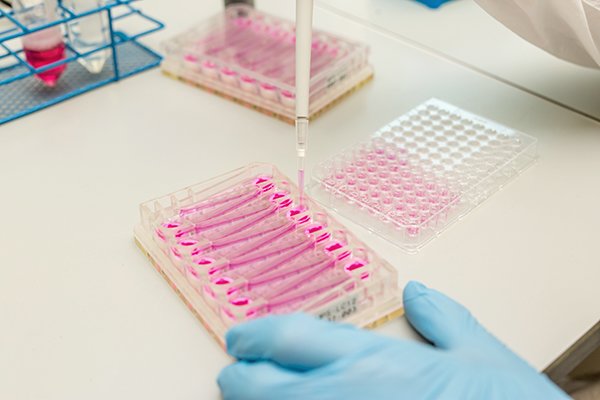
Funding
Currently, university funding schemes in Australia tend to be restricted to 3Rs funding. However, this is still an opportunity to apply for funding for replacement research and advance human-relevant science. If your university does not offer funding, why not ask that they offer a replacement funding scheme?
Details of 3Rs funding can be found via the University of WA, Griffith University, and the University of NSW websites. Contact the University of Sydney to inquire about their annual 3Rs award.
Global 3Rs awards or alternatives funding allowing international applicants:
Global Annual:
https://lushprize.org/
https://www.aaalac.org/awards/global-3rs-awards/
https://www.nc3rs.org.uk/international-3rs-prize
https://www.berlin.de/lb/tierschutz/preisauslobung/artikel.1121707.php
https://www.ardf-online.org/ardf-grants.html (preference is for USA applications)
http://www.ifer.org/available-fellowships.html
The PETA Science Consortium also offers a variety of funding awards
Global Occasional 3Rs award:
https://www.ufaw.org.uk/grants-and-awards/ufaw-grants-and-awards
https://www.ufaw.org.uk/ufaw-professor-william-russell-research-fellowship/professor-william-russell-research-fellowship
Research Methods to Cease Immediately
Due to reasons of scientific validity, animal welfare and the availability of validated alternatives, Animal-Free Science Advocacy calls for research using the below procedures to be immediately prohibited.
- Forced inhalation tests
- Forced swim test
- The development and production of monoclonal and polyclonal antibodies
- All primate research
- Safety testing for which there are validated alternatives
Please note in December 2022 the NHMRC issued policy statements restricting funding of smoke inhalation research and the forced swim test. If you are a researcher seeking non-animal methods to use in place of these methods, please contact our science outreach consultant Natalie Anderson via info@animalfreesci.org.au.
Non-Animal Model Education, Training and Networking Opportunities for Researchers
Already, many Australian researchers have joined a call for increased funding for the replacement of animals in research. If you wish to join these researchers please review Animal-Free Science Advocacy’s Business Case for Alternatives funding to replace animals in medical research, and contact us to be listed as a supportive researcher, supplying your name, email, research institution and area of research.
Additionally, Animal-Free Science Advocacy is keen to promote the innovative new research methods being used by Australian researchers to profile in our podcast, non-animal case studies or interviews.
If you would like your research to be featured, have any questions, need assistance in finding a non-animal replacement method, or would like to engage with Animal-Free Science Advocacy, please contact Animal-Free Science Advocacy‘s Science Outreach Consultant Natalie Anderson via info@animalfreesci.org.au.
If you are interested in becoming an adviser to Animal-Free Science Advocacy, please contact info@animalfreesci.org.au as we greatly value research expertise.
You may also like to follow Animal-Free Science Advocacy’s LinkedIn account as we often post content relevant to researchers.
Our guidance page for AECs provides some tips and resources on how those working in the animal research industry can best serve the interests of both animals and the validity of research.
We have profiled a selection of Australian research without the use of animals in our non-animal case studies.
The WORC.Community is a global network for organoid and organ-on-a-chip researchers. The community provides a live news feed, free access to the latest organoid papers, chip papers, selected protocols, webinars, training guides, and researcher chosen papers and content.
ALTEX has a calendar of events including training, conferences and symposia.
To join a community for Organoid Intelligence (OI), email send an email expressing your interest to ORGANOIDINTELLIGENCE@jhu.edu and you will be subscribed to a free bulletin.
View courses in non-animal technologies here.
The Lush 1R Network creates a collaborative network to share expertise and assist members, and others, in working towards the complete replacement of animal use in research and testing, with a particular focus on replacing animals in chemical safety assessment.
The NC3Rs NAMs network is a community of researchers, developers and industry and regulatory end-users working together to accelerate the use of new approach methodologies.
The Alliance for Human Relevant Science coordinates The Alliance Exchange, a series of online events promoting the use of NAMs.
Physicians Commitee for Response Medicine coordinates the Early-Career Researchers Advancing 21st Century Science, or ERA21, working with students and emerging scientists and connects them to the benefits of human-relevant research.
Support
Using animals in research can cause internal conflict and take a personal toll. For support resources, please see here.
Frequently Asked Questions
Read Animal-Free Science Advocacy’s responses to some commonly posed questions on the subject of animal experimentation.
Publication Bias
Please see an ‘Author Guide for Addressing Animal Methods Bias in Publishing‘ created by the Coalition to Illuminate and Address Animal Methods Bias.
External Resources
Please consult the below external resources of interest to the research community:
NHMRC Paper on the Implementation of the 3Rs.
NSW Research Review Panel Animal Ethics Committee education and training resources survey
Responsible Research provides free webinars on responsible research practices.
Stay informed
Sign up to our newsletter for all the latest news and SMS campaign alerts.
"*" indicates required fields
© 2024 Animal-Free Science Advocacy | ABN 17 208 630 818 | Privacy Statement | Terms & Conditions